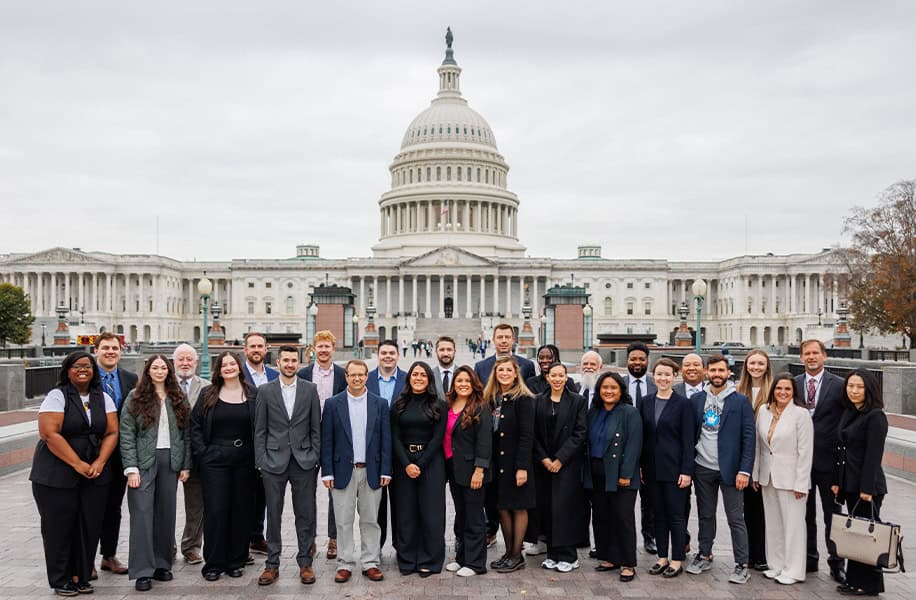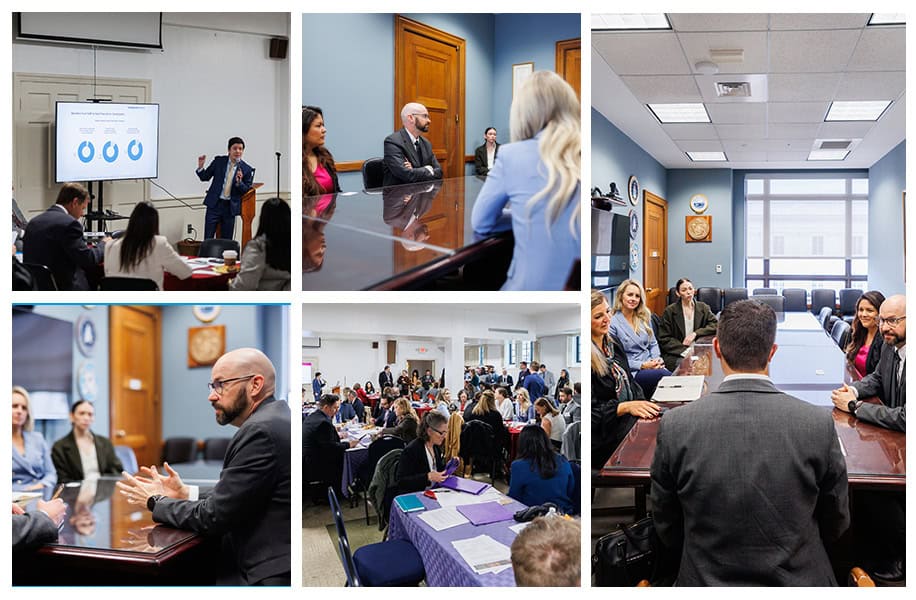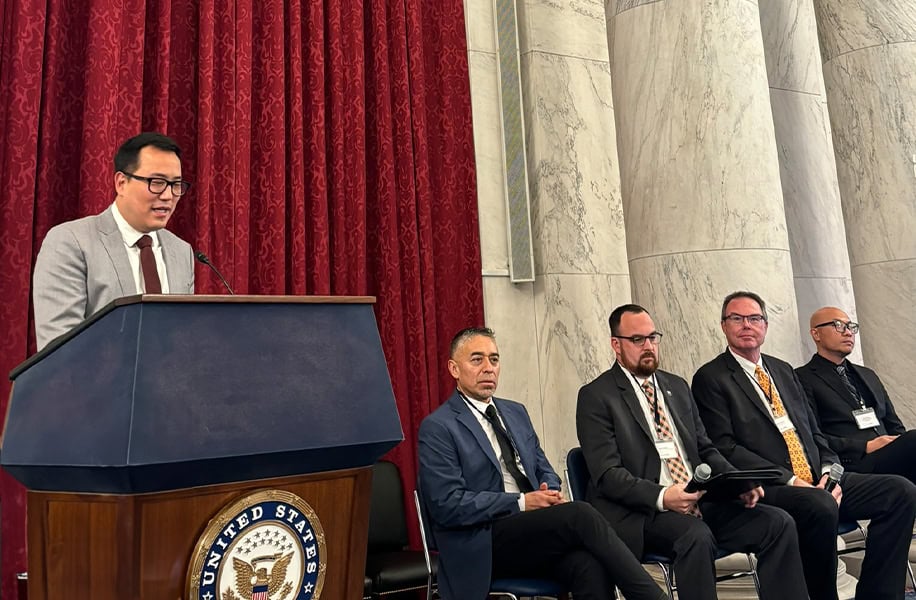|
Getting your Trinity Audio player ready...
|
A Day of Faith in Action
As a dozen pastors, church leaders and World Relief staff walk through the long hallways of the Senate buildings, the overlapping echo of our group’s steps is a mix of deliberate formality and quiet resonance. Every footfall feels intentional, punctuating the silence in a way that reflects the gravity of the space. There is a sense of purpose to each step, a reminder of the all-important deliberation that often happens within those offices we will soon be walking into.
This image of Christians stepping into “halls of power” to amplify the voices of their neighbors and community members, who are being silenced or ignored, will stay in my memory forever. Last month, over 100 ministry leaders from across the country came together unified in prayer and a conviction to follow the call in 1 John 3:18 to, “Let us not love in word or speech, but in action and in truth”. Their mission: to advocate for their refugee and immigrant friends, neighbors, congregants and family members in Washington D.C. while pointing to policies like the Afghan Adjustment Act, DACA, the Dignity Act and the Refugee Resettlement Program for discussion and seeking support.
What happens when faith leaders enter the halls of power to advocate for justice moved by their communities most impacted by government policies? Lives are transformed and God is glorified.
Faith as the Foundation of Advocacy
As always, we must anchor our beliefs and actions in the word of God. Believe it or not, the Bible has much to say when it comes to advocacy. In simple terms, advocacy means speaking up in favor of, supporting, defending or pleading on behalf of others. We see almost this exact directive in Proverbs 31:8 “Speak up for those who cannot speak for themselves, for the rights of all who are destitute.”
In the Bible, Esther is a shining example of how to be an advocate driven by a divine mission when the Jews were being persecuted. In her moment of doubt, Esther sought counsel and was met with the reality of what her silence could mean for her people. Out of fear of losing her status as Queen and even her life, Esther could have stayed quiet and remained in the comfort of a life of privilege. But Mordecai reminds her what’s at stake and the invitation God has laid before her, “For if you remain silent at this time, relief and deliverance for the Jews will arise from another place, but you and your father’s family will perish. And who knows but that you have come to your royal position for such a time as this?” Esther 4:14. Esther ultimately uses her voice and position to protect an entire population experiencing vulnerability going before those in power and into spaces she was never supposed to be in.
Like Esther, we have the opportunity to meet the moment when people are in desperate need of an ally to speak up on their behalf. President-elect Trump has pledged to suspend the Refugee Resettlement Program upon entering office, halting a form of legal immigration that has long served as safety for refugees. There have also been mentions of mass deportations and the threat of family separation, at a much larger scale than in 2018, have many Christians worried for their immigrant neighbors. At the same time, Afghans, many of whom served our U.S. military as translators during the war in Afghanistan, still wait for a final decision on their future in this country. In the midst of these urgent policy decisions, our faith compels us to step into action. Part of that action is going directly to our elected officials and leveraging our collective voice in spaces where we need to be heard the most.

Advocacy Days 2024
In partnership with the Evangelical Immigration Table, we co-hosted over 100 pastors, ministry leaders and staff in Washington D.C. last month. Over the course of two days, these advocates learned about immigration policy rooted in biblical principles, how to minister to immigrants in the current political and cultural climate and were briefed on policy impacting refugees and other immigrants. They then met with over 50 congressional staffers and their local representatives to address direct concerns for their community in light of the incoming administration.
Advocacy Day wasn’t just about politics, but more about living out the Gospel by championing family unity and human dignity. Chelsea Sobolik, our Director of Government Relations, shares, “Sitting across the table and having hard and truthful conversations with staffers [reminded] me of the importance of relationships. Hearing one another out [reminded] me how changing hearts and minds and even policy really does happen right here. At the end of the day, as a Christian, seeing the dignity, worth and value of the people we serve and for the members of Congress and their staff is vital to our biblical advocacy.”
World Relief has a long history of bi-partisan advocacy as an extension of our work in boldly engaging with the world’s greatest crises in partnership with the church. For example, Representatives Maria Salazar (R-FL) and Hillary Scholten (D-MI) co-sponsor the Dignity Act which proposes comprehensive immigration reform as well as order and security for the southern border. Together, they presented the state of the bill to our group of pastors and leaders, demonstrating the power of collaboration when reaching across the aisle. “Immigration at its core is about human dignity. We have lost sight of human dignity in the enforcement of our immigration policy.” Rep. HIllary Scholten. The room was filled with hope as immigration was discussed not as a threat but as an issue that can have a real solution when political parties unite to find tangible solutions. It is our desire to uplift and support those efforts that honor the worth and dignity of refugees and other immigrants looking for legal pathways to rebuild and find safety.

Why the Church Must Lead in Advocacy
When Esther used her voice to advocate before the king on behalf of her people, she didn’t do it alone. She called on her entire community to fast and pray as she prepared to risk her life in lifting up her voice. This example of collective advocacy is not only powerful but still very applicable to today. The church and its leaders are uniquely positioned to advocate for justice, drawing on their authority and connection to their communities. They witness firsthand the ripple effects of how policy affects people and bring that experience when meeting with their elected officials.
Daniel Yang, World Relief’s National Director of Churches of Welcome, declared, “God himself is setting the world to disciple here in the churches of America. A Jerusalem model to an Antioch model. The most vulnerable are coming here so that the world might reach us and disciple us. By saying yes, we are partnering with what God is doing around the world. Our mission will not change.” If God has adopted all of us into his family, then the question becomes, have we adopted one another? Paco Amador, pastor of New Life Community Church in the Little Village area in Chicago, shared how, as pastors and leaders, their ministry is intertwined with their lives, “This is our life, our kids- we can’t change vocations. I would be incredibly expectant for what God will do in a church that will love and welcome their immigrant neighbors. You don’t view ministry as just as-is but as an embodiment of ‘I love you.’”

Be Part of the Transformation
Now is the time to bring faith into action. Time and time again we’ve witnessed the transformative impact the church can have when it moves together, speaking out against injustices and mobilizing its people and communities to create change. 2 Thessalonians 2:13 tells us to “never tire of doing what is good.” Today, we are even more determined to remain steadfast in our mission as an organization. That’s why we are calling on you to join us in this work to support those experiencing displacement as a refugee and in need of assistance in their immigration journey. Together, we can transform lives by speaking up.
You can:
- Advocate: God has given you a voice. Steward it well by using it to urge your elected officials to support asylum policies like the Afghan adjustment act and permanent pathways to citizenship for DACA recipients and the Dignity Act.
- Give: Your gift to The Path supports displaced people at every step of their journey, whether they’re rebuilding their home in the wake of a disaster or being resettled in a new country as a refugee.

Jessica Galván is Sr. Content Writer at World Relief. She is passionate about storytelling and amplifying diverse voices to reveal the beauty of God’s creation. She is also the Editorial Director for Chasing Justice and prior to World Relief, she was a freelance writer and editor for a variety of clients in publishing, most recently Penguin Random House. When she isn’t wordsmithing for the pursuit of faith and justice, she is spending time with her family in the Houston, TX area.


